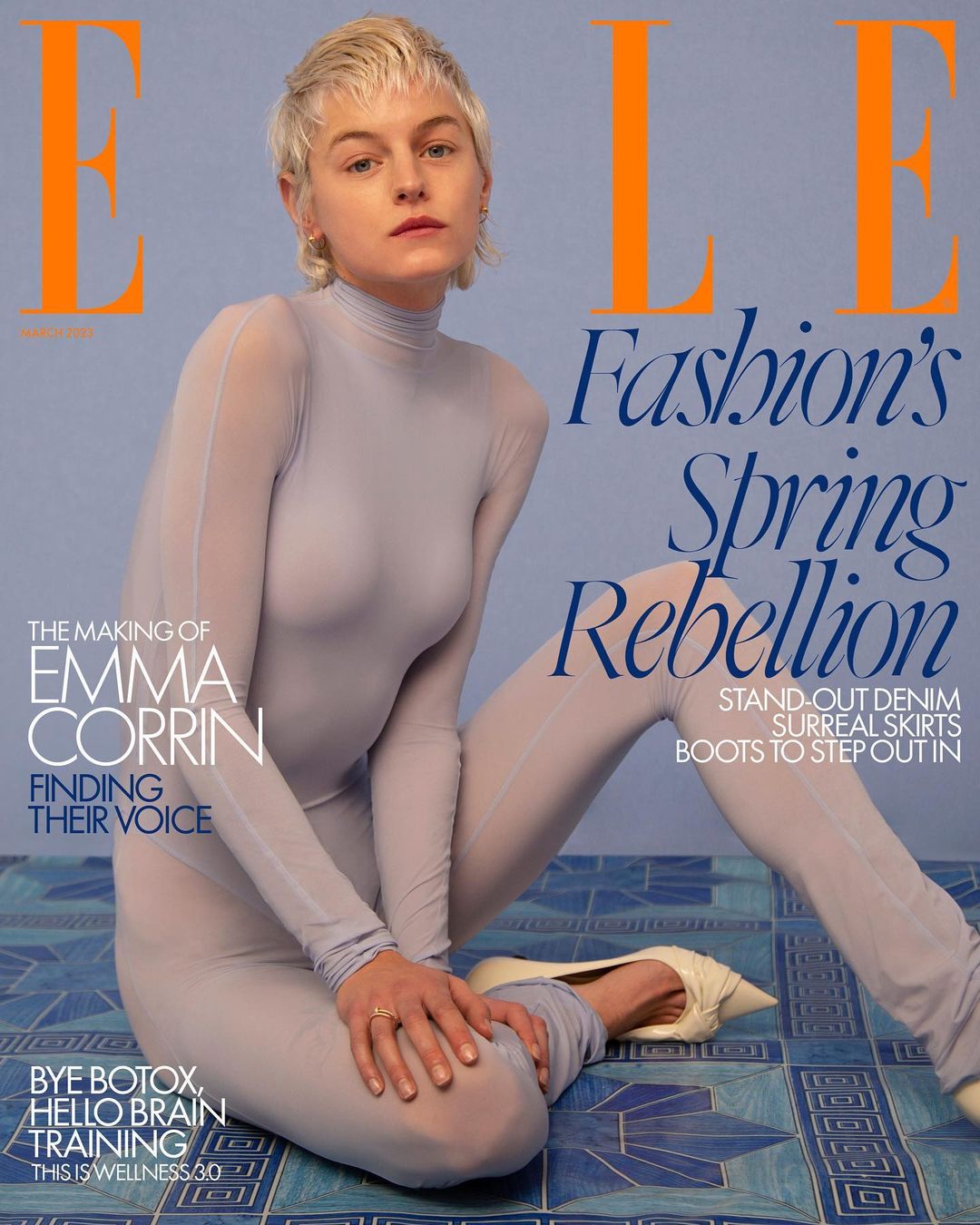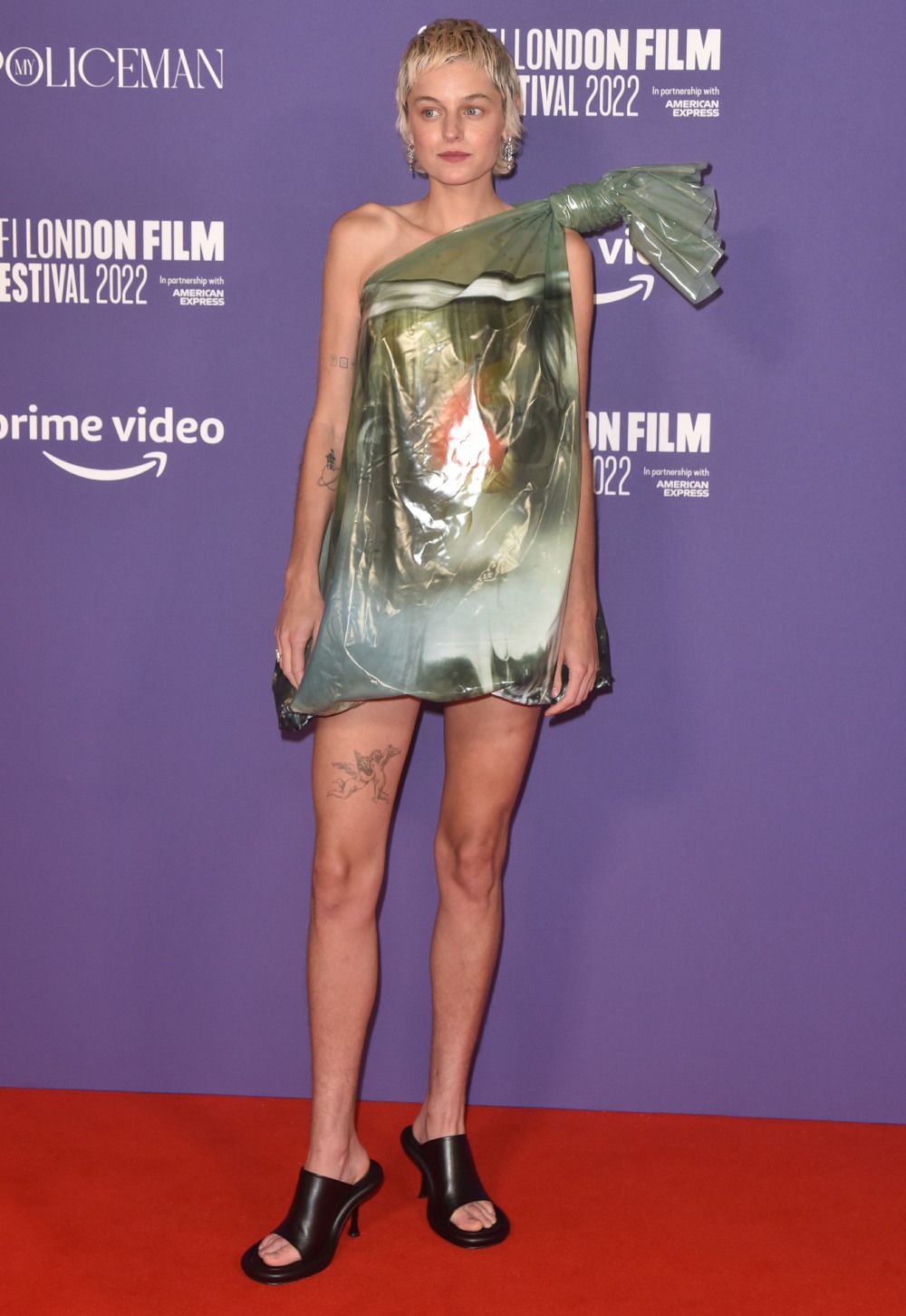Emma Corrin, who is nonbinary, covered a recent issue of Elle UK. They don’t seem to be promoting anything in particular, although I should take this moment to once again recommend the latest adaptation of Lady Chatterley’s Lover on Netflix. Emma is AMAZING in it, as is Jack O’Connell. While Corrin made a name for themselves in somewhat “period drama” of The Crown, I’ve never thought of them as a bodice-ripping, period-drama heroine before. But Corrin was really good in that role. When they were interviewed by Elle, they were finishing up a brief run of Orlando on the London stage. Some highlights from this cover story:
Emma questions the relevance of gendered-awards show categories. ‘It’s difficult for me at the moment trying to justify in my head being non-binary and being nominated in female categories. When it comes to categories, do we need to make it specific as to whether you’re being nominated for a female role or a male role?’ The soundbite became the head-line, which travelled across the DailyMail, ITV, CNN and more. Corrin bristled. ‘…if you are interviewing me about my work and the subject of gender comes up, please respect and represent the integrity of my answer in the context of the interview as a whole,’ they wrote in a caption on Instagram. ‘What I mean is, do not sensationalise an answer for the sake of a clickbait headline when it is really a subject that, to be a headline, requires proper enquiry and should be represented with more nuance.’
On Virginia Woolf’s Orlando: ‘Michael Grandage, the director, spoke a lot about how it was on the syllabus when he was at school. And I would love it if it was back on our school syllabuses. I think it’s such a brilliant book that teaches you so much about identity and love – all these fundamental questions that we ask ourselves,’ they explain. They say the stage adaptation is ‘very much a celebration of theatre as well as a celebration of queer joy and love and all of these other things’.
Their tight-knit circle of friends & colleagues: ‘I think the people in these experiences really make it. It doesn’t matter how brilliant the writing is, it doesn’t matter how brilliant the director is. If you don’t have each other, if you don’t have a sense of community, it can be hard. You really feel supported by people, like they have each other’s backs. And that’s a beautiful thing.’
They need safety: ‘I need to feel safe. And I need to feel connected to the people who I’m talking to or working with every day.’ Meanwhile, they’ve lived with the same three flatmates for five years, in a building right next door to their best friend, Avigail Tlalim.
New Year’s resolutions: ‘It’s my New Year’s resolution to be more in touch with my two brothers because we’re all quite bad at communicating. I just don’t see them. It’s been seven months. I’d love to get better at carving out space and time for myself. Even just yesterday, I didn’t have shoots or meetings and stuff. I took my dog for a really long walk, for like an hour and a half. It was like, “Wow, I haven’t done this.”’
I’ve mostly avoided writing about the ongoing debates and conversation on gendered awards categories because I don’t really have anything to add? I think Corrin makes a legitimate point – where do nonbinary actors fit in, and why shouldn’t awards shows be more inclusive? But I also think there’s a perfectly legitimate case to be made that, when you remove gender from the categories, in practice and in the real-world, only dudes will get nominated for things. If you have Best Performance or Best Pop Star or Best Supporting, there won’t be anything resembling gender equity. But as Corrin says, it’s a conversation which needs more nuance and thoughtfulness.
What else? I’ve read a lot of Corrin’s interviews over the years, and I’ve enjoyed watching them blossom and find themselves. I’m surprised that they still have roommates and stick to this trusted circle of friends though – I really thought they were opening up more and trying different things.
Photos courtesy of Avalon Red, cover courtesy of Elle UK.
- Cast member Emma Corrin attends the Special Presentation and European Premiere for ‘My Policeman’ at The 66th BFI London Film Festival at Southbank Centre, Royal Festival Hall, London, England, UK on Saturday 15 October, 2022.,Image: 730899575, License: Rights-managed, Restrictions: Please credit photographer and agency when publishing as Justin Ng/Retna/Avalon., Model Release: no, Credit line: Justin Ng / Avalon
- Emma Corrin attends ‘My Policeman’ – European Premiere the BFI London Film Festival, at the Southbank Centre, Royal Festival Hall in London, England. Saturday 15th October 2022 -,Image: 731205592, License: Rights-managed, Restrictions: NORESTRICTIONS, Model Release: no, Pictured: LFF – ‘My Policeman’ – European Premiere, Credit line: James Warren / Bang Showbiz / Avalon
















There are categories like director that aren’t genered. And who gets nominated? White dudes. I understand the discussion and I completely understand that it must be weird and uncomfortable for Emma and other nonbinary folks but I don’t have a solution here. I also don’t know if it could help if the category recognized the gender of the character. Then you (hopefully) have a nonbinary character and it’s the same issue.
Someone smarter than me needs to figure this out but anyone who watches award shows can see that lumping everyone together will not fix anything.
I understand but we’re not all non-binary, don’t expect the world to act like everyone is.
I’m so glad this was the first comment because it was my immediate response. For all that I feel the rigid gender binary of our culture has created a lot of problems, the reason separate opportunities emerged for women-identified people is because we lose out when categories are by and for men (in entertainment, sports, work places). Non-binary folks who were assigned female at birth will continue to be grouped with women in this regard.
My absolute dream is to live in a gender neutral society. Heck, I wish we all styled ourselves like 80s hair bands. But first we need gender equity to breakdown the patriarchal structure of our society.
Thank you, that was my first thought as well. Like you said, just look at the Director category for a preview of what would happen. Or, you know, politics. Or being CEO. Or anything else where men and women supposedly compete “equally.”
Sometimes i worry that if everyone is non-binary then we’ll go back to leaning harder into misogyny. If there is no gender, how can someone be sexist? I can see a lot of assholes running with this logic. The Ezra Millers of the world will ruin any chance of a utopia. No sexism if there are no sexes? The white man will lead the march if it means they can hold on to their control without being called out of lack of representation. It will start with Hollywood.
Humans suck.
I worry about that too. I’m a white woman, but I see that every time a person of color is celebrated that internet voices scream “I don’t see color! Stop dividing us!” and it is/will be the same with gender. If we embrace gender neutrality, we’ll be told that the token woman who breaks barriers isn’t an example of anything. We don’t see gender. Meanwhile, if mediocre white men get called out on their lack of unique qualifications, we’re dismissed as “woke” or “SJWs” (neither of which is a bad thing). And yeah humans suck.
The solution is to have gendered categories AND non-gendered categories. Because when there is not a category that is explicitly protected only for women and/or non-binary people assigned female at birth, men will make absolutely certain that women are 100% shut out of it. It’s not by accident. It’s extremely deliberate.
As we’ve so far seen, all non-gendered competitions are also swept by men and shut out for women. I’m not going to wade into the toxic sports debate but this also takes place in sports when a non-gendered category is created.
If we go with the obvious solution of having both,, men can win the men’s category, and the non-gendered category, and women can at least have something.
Literally we’ve seen in England what happens if you de-gender categories. Men get nominated and win, it’s not “everybody free-for-all.”
I’d rather have a third NB category than “de-gender” and then it ends up all men, thanks.
Agreed.
You just know that’s what would happen if the Oscars took that route. Nothing but men winning it all.
If they want to create a bonus non-gendered category beyond the Actor/Actress ones, they could call it Best All Around Performance or something along those lines.
The Grammies are another sad example. Witness Harry Styles’s 2023 wins, in what should have been a strong year for women.
Right now, for all these awards, studios choose which category people are nominated in. I’m guessing that’s how it’s going to stay. Actors will have some say in the matter. Curious about when the first nomination to cross gender lines will happen.
Canada has announced that in figure skating pairs and ice dance teams can be made up of two people of any gender. They won’t be able to compete internationally, but it’s a start.
Wow, they seem really, really young in this interview. Look, I’m nowhere close to Emma Corrin-level famous, but I’m prominent in my field and get interviewed a lot, and ffs what is this: “please respect and represent the integrity of my answer in the context of the interview as a whole.”
It would be lovely if the media worked that way, but, well, it doesn’t. I get misquoted all the time and if you can’t deal with your nuanced answers getting distilled to semi-accurate clickbait soundbytes, you’re maybe in the wrong profession?
I can understand their discomfort with being put into the women’s category, when they don’t identify as one. But as others have stated, and we’ve all seen, open ungendered categories just lead to more/only men being nominated. I’m for having an additional award each for lead and supporting performances by a non-binary person. Like best actor, best actress, best lead non binary performance, and the same for supporting roles too.
People have already brought up the almost certain sh**tshow non-gendered categories would be, and oddly I’m not sure it’s that necessary in acting categories:
My thought would be if you are non-binary or gender fluid or whatever, submit by the role you played. Emma played Princess Diana, an unquestionably cis-woman “character”. They presumably beat out mostly cis-female actresses for the role. So they submit as best actress. If you play a male role, submit in best actor. And beyond that? If you are playing a role that is non-binary, then a choice would have to be made, but in reality that is such a minuscule number of roles it doesn’t warrant a change. Anyway, just a thought.
Agree
Agree with the comments about how doing this potentially solves one problem and creates another. There’s also the issue from an “award show is a thing that people watch on TV” perspective, that going neutral gendered on, say, the Oscars, would eliminate two acting categories that are big draws to a telecast because those are the bigger names that draw viewers. They could create new categories (like breakout performance, etc.) or split the acting awards into drama and comedy like the Golden Globes, but that still would not prevent the nominees from not being overwhelmingly white and male.
I understand that it’s a difficult sitiation for them but when award categoties aren’t gended it is just mostly white men that get nominated. This is what happened this year the the Brits https://www.bbc.com/news/entertainment-arts-64264069.amp
Emma was heartbreaking, touching, and powerful in Lady Chatterly’s Lover. Beautiful take on the classic story. Emma and their costar brought the best out of those roles.
Agreed. They were absolutely wonderful in Orlando as well.
I mean, the obvious solution is to make more films with non-binary characters, and then there’s a plethora of options for nominees in a non-binary acting category.
Disappointed to see how many people here are acting like Emma is being out of line by making this proposal. As Kaiser said, this is an ongoing conversation that requires a lot of nuance. So give Emma that much — it takes a lot in this anti-trans climate to speak up as a nonbinary or trans person. And I get the point about the Director category and that invariably goes to men; that is likely what would happen. But tell me what will happen when a transwoman gets nominated for “best Actress”; don’t, i’ll tell you what will happen: all the TERFs will come out complaining a “man” is stealing an opportunity from a “biological woman.” Because that’s what happens every time a transwoman is in a competitive space (awards, sports)– she/they are immediately treated as if they’re not a woman and encroaching on “real” women.
So it’s all good and well to have a good faith discussion about de-gendering the categories. But do take into account how people would receive a transwoman nominated for Best Actress. If it’s anything like how transwomen athletes are treated, it will not go well.
The terfs always come out to be dicks. They don’t need us to recognize a problem that would 100% arise if they did away with gendered categories. Or do you honestly think a nonbinary actor would have a better chance at winning then? No. This is not a problem limited to the film industry, we just backed ourselves into a shitty corner by building our society on a binary idea of gender.
Sporting competitions are not the same as acting – that’s a false equivalence
i hope you get picked, sis
Sports competitions are about bodies competing against each other. That will always be controversial because differences between bodies are very relevant in sport. That’s not the case in acting.
My feeling is there needs to be nuance on both sides with this topic. We can’t discuss the reaction to transgender individual without discussing sexism, and we do have to be realistic about why there’s a reason why there’s some backlash among cis women against this. Their anger is misplaced, but the roots of where it comes from is valid.
Cis women do not enjoy any extensive gender privilege, and what they do have is also dependent upon other factors like class, race, health, etc. They’ve had to carve our their place in society as much as sexual and gender minorities. Their rights are as viciously under attack right now as trans people’s are, and for a lot of them, gender and sex cannot be separated because their physical bodies and reproductive capabilities are the very mechanism by which patriarchal systems are enforcing gender roles on them.
So I do understand, if not entirely agree, with the gut reaction some women have to seeing transwomen enter these spaces and receive accolades and sometimes even more attention than they do when, depending on when they transitioned, they might have enjoyed quite a bit of male privilege preceding it. I don’t think it’s necessarily fair or even right to approach it from that angle, but I do think you have to recognize those feelings as valid in order to process them. Ultimately, I think the larger elephant in the room is misogyny. Had we done a better job as a society tackling sexism as a destructive force in Western cultures, I think certain NB/trans issues would also be mitigated by extension precisely because a lot of them are rooted in distrust created by that very gender divide in the first place.
She is a sad woman, I hope she gets the help she needs.
Too much time on her hands and no real problems, so she has created this nonbinary issue as a way to get attention…
I’m sympathetic to her position and feel it has some merits, but my own feeling is that their own position lacks some nuance. Like, it’s one thing to recognize NB performers exist, fair enough, but they ARE choosing to play characters that present female and use female pronouns. So they want to use the pronoun that fits their biological sex when it benefits them to do so on screen, but they don’t want to compromise with it being the default for the majority of the population when it comes to categorical rewards. Similar to the discussions about LGBT+ portrayals, that’s a line of thinking I’d be real cautious pursuing. It’ll open up the question whether then it’s fair for them to be taking female roles to begin with and potentially limit other people in the field.
Additionally, it seems to suggest a narrative where cis women are in a position of social power that they really don’t have. A woman who isn’t trans/NB still has to deal with discrimination based on her gender Female performers aren’t exactly privileged here. They are also a group that has been minimized and limited in terms of recognition across media. For some of them, “actress” is likely empowerment, especially given the political climate right now.
I mean…I’m sensitive to the mental health issues at play here, but as a minority, you do have to sometimes accept that you ARE a minority. You do not define the majority experience. Your voice is not one that speaks for most. There is a point where you have to be a little realistic about the point where things tip into a certain sense of entitlement instead of coming to a certain compromise — mainly because, quite frankly, it’s dangerous to forget they have the power in numbers.